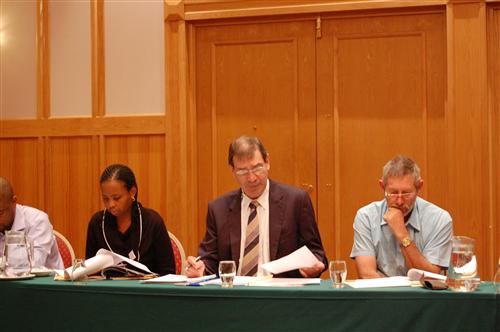The Orange-Senqu River Commission (ORASECOM) was established by the Governments of Botswana, Lesotho, Namibia and South Africa through the "Agreement for the Establishment of the Orange-Senqu Commission" on 3 November 2000 in Windhoek, Namibia (Earle et al. 2005).
The Preamble to the Agreement recognises the "Orange-Senqu River System as a major water resource in the Region", committing the four Member States "towards the realisation of the principle of equitable and reasonable utilisation, as well as the principle of sustainable development with regard to the River System". It also recognises the following rules and agreements:
-
Helsinki Rules (1966)
-
UN Convention on the Non-Navigational Uses of International Watercourses (UN Convention; 1997)
-
The Protocol on Shared Watercourse Systems in the Southern African Development Community (Original Protocol)
Article 1 establishes the ORASECOM as an international organisation that possesses an international legal personality within the legal systems of each member country, and has the capacity to enter into international agreements;
Article 2 establishes institutional arrangement of the Commission. The highest body of the Commission is the Council, consisting of one delegation per Party. A delegation shall include not more than 3 permanent members, one of whom will be the delegation leader;
Article 3 specifies the meetings of the Council, which shall be held at least once a year in ordinary session and at the request of any of the Parties in extraordinary session. The meetings shall rotate between the Contracting Parties. Each delegation to the has one vote, and no decision of the Council shall be valid unless taken at a meeting attended by at least three of the four delegations;
Article 4 states that the objective of the Council is to serve as a technical advisor to the member countries and perform other functions assigned by the member countries on matters pertaining to the development, utilisation and conservation of water resources in the Orange-Senqu River System;
Article 5 outlines the functions of the Council. The Council shall take all measures required to make recommendations or to advice hte Parties to ensure equitable and reasonable utilisation of water resources in the River System, and to support sustainable development in each country;
Article 6 presents the powers of the Council to establish working groups and appoint service providers and technical experts as required. The Council is also given authority to ensure that recommendations on any matter in Article 5 be contained in a report, including the costs, which shall be signed by each delegation;
Article 7 outlines the obligations parties; states that Parties shall fully cooperate with and support the implementation of this Agreement and recommendations of the Council. Parties shall utilise resources of the River System in an equitable and reasonable manner, take all appropriate measures to prevent causing significant harm to any other Party, exchange available information and data on the River System, and, notify the Council of any project, programme or activity related to the River System which may adversely affect other Parties;
Article 8 addresses the issue of settling disputes and stresses the importance of negotiations to reach a settlement. The Parties may bring a dispute to the SADC Tribunal, if the parties have not been able to arrive at a settlement with six months after the start of negotiations. The Parties are required to accept the decision of the Tribunal as final and binding;
Article 9 describes the process for a Party to withdraw from the Agreement. Following three years from the date the Agreement enters into force, a Party may withdraw from the Agreement with written notice to the other Parties;
Article 10 specifies the financial arrangements within the Agreement. Each Contracting Party is responsible for the costs of attending and participating in the meetings of the Council. The Contracting Party hosting a Council meeting is responsible for the costs of holding a meeting. All other costs are shared equally among the Contracting Parties, unless otherwise agreed to by the Council; and,
Article 11 contains the general and final provisions, including that the Agreement enters into force upon diplomatic notification by all parties of their compliance with the constitutional requirements for its implementation, and that it may be amended by mutual consent of the Parties.

ORASECOM members meet regularly in one of the basin states.
Source:Hatfield 2009
( click to enlarge )
